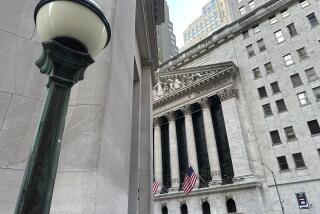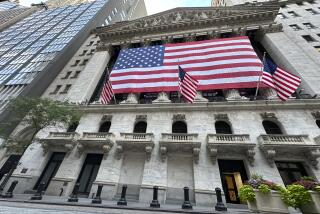Treasury Issues Off to Hot Start
- Share via
The rich keep getting richer in the bond market.
Treasury bond prices rocketed on the first day of the new year, sending yields plunging anew, after a dismal report on U.S. manufacturing activity fueled another rush to lock in returns.
But in the corporate bond market, yields on “junk” issues have been hovering in a narrow range in recent weeks--and far above their levels in September--as investors continue to fear higher default rates in a slower economy.
Those safety concerns are not an issue for the Treasury market: The yield on the one-year Treasury bill plummeted to 5.17% Tuesday from 5.40% on Friday, and now is the lowest since September 1999.
Longer-term yields also slumped, driving the 10-year T-note yield below 5% for the first time since spring 1999. The yield ended at 4.92%, down from 5.11% on Friday.
In terms of price, Treasury issues posted their biggest one-day jump in value since October 1998.
Treasury bond buyers are betting that the Federal Reserve will act soon--certainly by the end of this month--to cut its official short-term interest rate, now at 6.5%.
Investors “are becoming increasingly concerned about the recession scenario,” said Thomas Marthaler, who helps manage $6.5 billion in fixed-income securities at Chicago Capital Management. Fed rate cuts are viewed as the only sure way to keep the economy from deteriorating too quickly.
But with each dive in Treasury yields, the market prices in more of whatever the Fed ultimately will do with its short-term rate, traders note. Just how low is too low for long-term T-bond yields is not clear, but investors are showing no fear yet that they’re overpaying, traders say.
One element of the manufacturing report might otherwise have scared investors away from bonds Tuesday: The report showed that prices paid for raw materials by manufacturers rose in December, a sign that inflation may be rising due to an increase in the prices of oil, chemicals and paper, analysts said.
But inflation worries didn’t register with Treasury buyers.
“A year ago, people were looking for any smell of inflation, and now they care less because the economy is slowing down and that means the inflation numbers will be lower, too,” said Joseph Pregiato, co-head of institutional fixed-income sales at Josephthal & Co.
Meanwhile, the corporate bond market got another reminder of the riskier times investors face in those securities.
The value of corporate bonds that went into default in 2000 rose almost 40% to $33.4 billion compared with 1999, and defaults are expected to rise further this year as a slowdown in the U.S. economy impairs more companies’ ability to repay debt, Standard & Poor’s Corp. said.
A record 106 issuers of junk bonds defaulted in 2000, up from the previous record 89 issuers in 1999 that defaulted on $24 billion, S&P; said.
More to Read
Inside the business of entertainment
The Wide Shot brings you news, analysis and insights on everything from streaming wars to production — and what it all means for the future.
You may occasionally receive promotional content from the Los Angeles Times.










